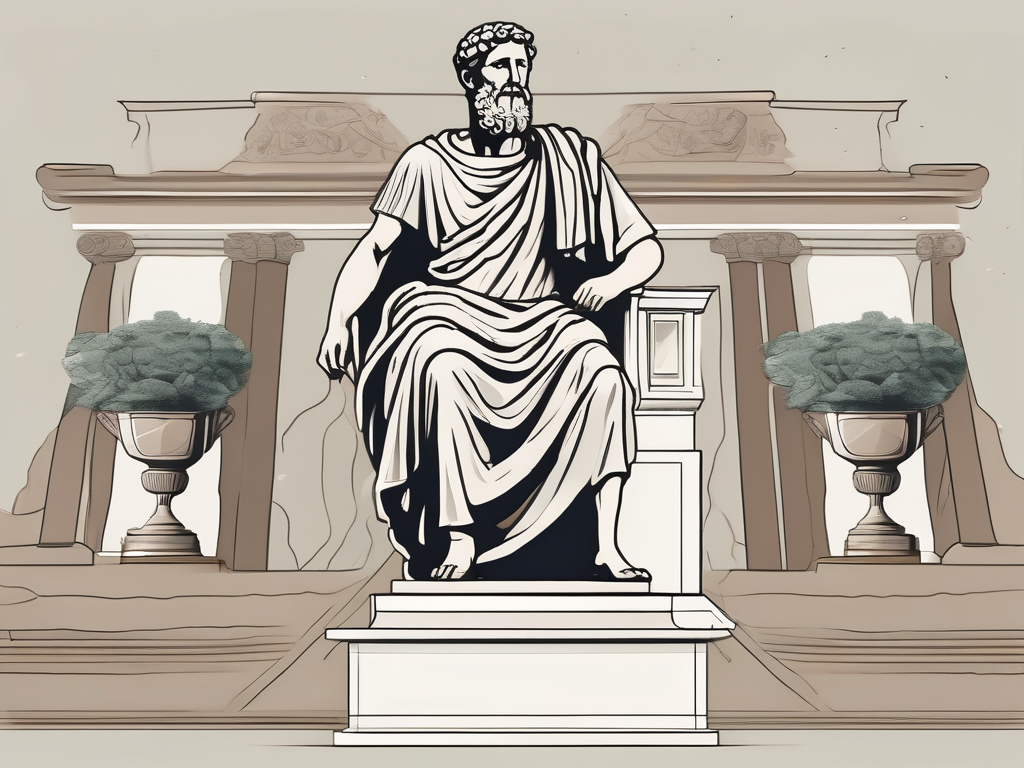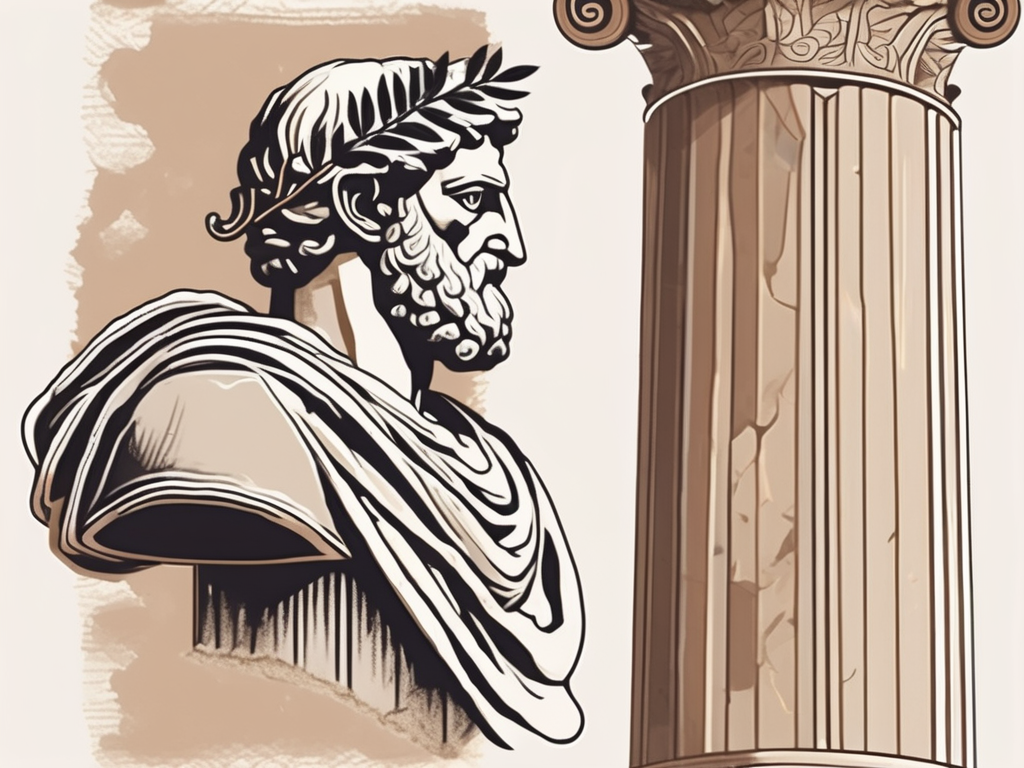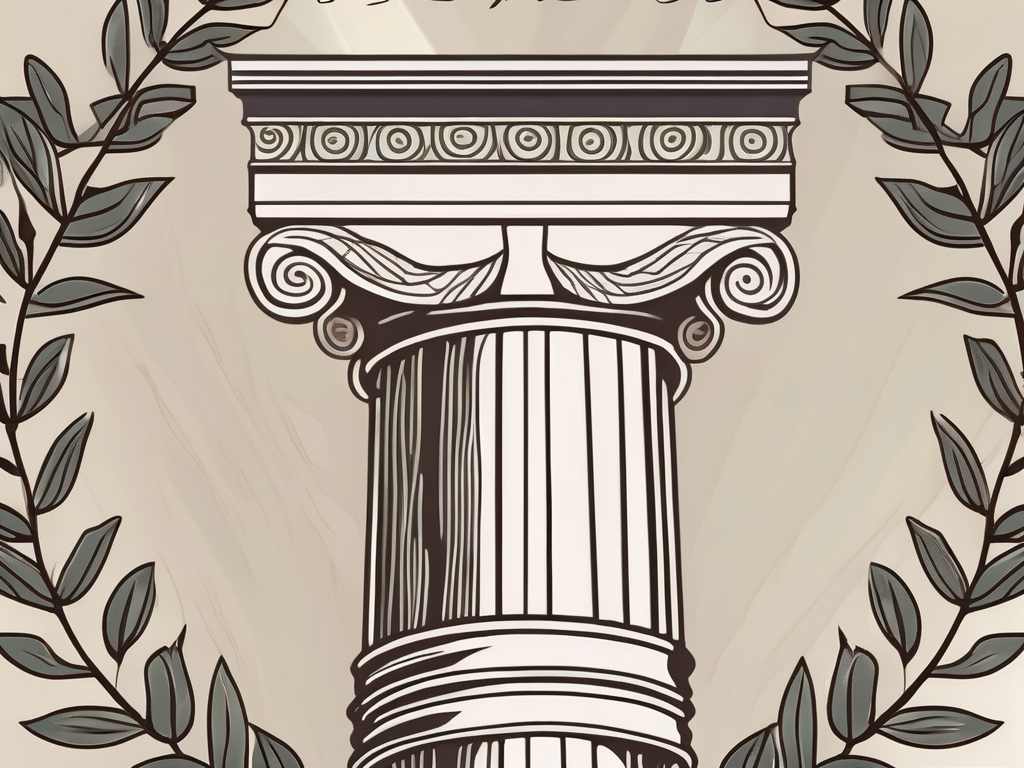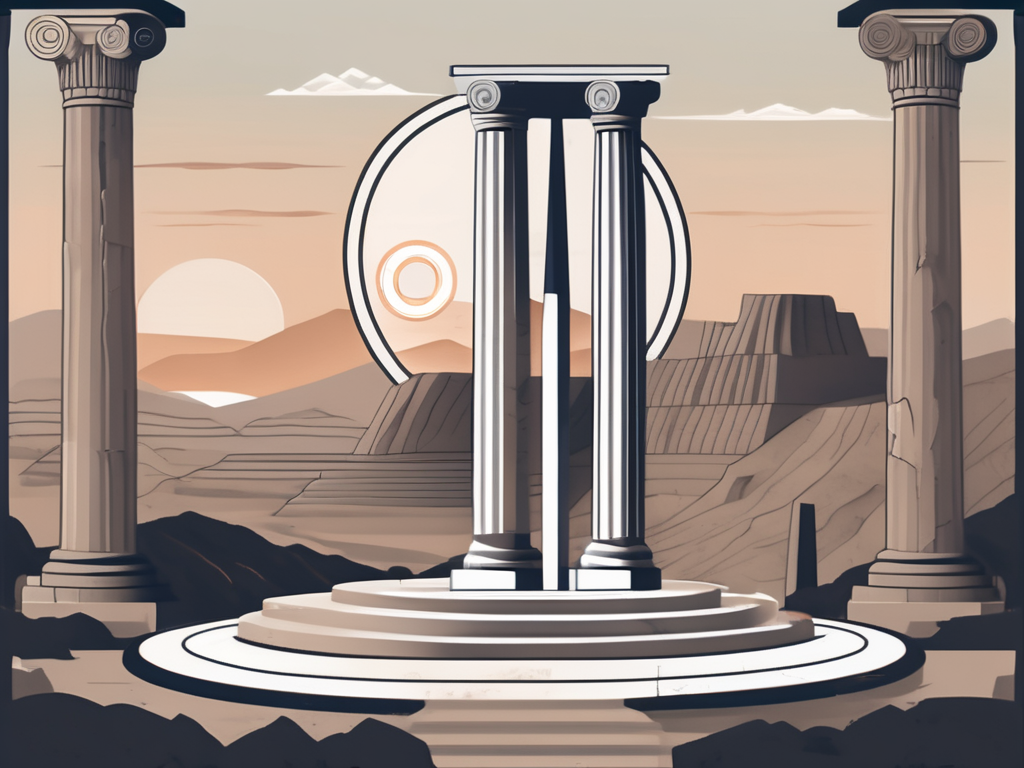Stoicism, an ancient philosophy that emphasizes personal virtue and inner tranquility, found its most prominent advocate in Marcus Aurelius, the revered Roman emperor. His journey into Stoicism and the impact it had on his life and rule is a fascinating exploration of philosophy in action. In this article, we will delve into the core principles of Stoicism, examine how Aurelius adopted and practiced this philosophy, explore his renowned work, Meditations, and discuss the lasting legacy of both Aurelius and Stoicism.
Understanding Stoicism: A Brief Overview
To truly understand the profound connection between Marcus Aurelius and Stoicism, it is essential to delve into the foundations of this centuries-old philosophy. Stoicism, originating in ancient Greece, was further developed by notable Roman philosophers such as Seneca and Epictetus. At its core, Stoicism teaches that virtue, inner peace, and wisdom are the keys to living a fulfilled life. Unlike other philosophies that primarily focused on external circumstances, Stoicism emphasizes the individual’s remarkable ability to control their own reactions and emotions.
This philosophy suggests that one should actively cultivate virtues such as courage, wisdom, self-discipline, and justice. By doing so, individuals could attain tranquility and freedom from negative emotions, finding perfect harmony with the world around them.
The Core Principles of Stoicism
The core principles of Stoicism can be summarized in three main tenets:
- Virtue as the Highest Good: Stoics firmly believed that virtue, or living according to moral principles and excellence, was the ultimate goal in life. Material possessions, fame, and external circumstances were considered secondary and ultimately insignificant in comparison.
- Acceptance of What Cannot be Controlled: Stoicism encourages individuals to wholeheartedly accept the aspects of life that cannot be controlled, such as the actions of others or unforeseen events. By focusing only on what is within their control, individuals can maintain emotional balance even in the face of adversity.
- Living in Accordance with Nature: Stoics believed that everything in the universe is interconnected and governed by a universal reason. By aligning one’s actions and thoughts with this natural order, individuals can achieve profound inner harmony and lasting fulfillment.
Stoicism in Ancient Rome
Stoicism found fertile ground in ancient Rome, a society that grappled with political instability, social upheaval, and personal challenges. The Romans greatly admired the Stoic values of self-control, discipline, and unwavering devotion to duty. As the most powerful man in Rome, Marcus Aurelius embodied Stoic ideals and seamlessly integrated them into both his personal life and his reign as emperor.
Aurelius’ unwavering commitment to Stoicism allowed him to navigate the complexities of political leadership and make sound decisions while maintaining a profound sense of justice and virtue. His influence extended far beyond his military conquests, shaping the philosophy of governance in the Roman Empire for generations to come.
Moreover, Stoicism permeated various aspects of Roman life. It became a guiding principle for many citizens who sought solace and guidance amidst the chaos of daily existence. The Stoic emphasis on self-discipline and the pursuit of virtue resonated deeply with the Roman people, offering them a path to find meaning and purpose in their lives.
Stoic teachings also found their way into Roman literature, with prominent authors like Seneca producing influential works that explored the practical applications of Stoic philosophy. These writings served as a source of inspiration and guidance for individuals seeking to incorporate Stoic principles into their own lives.
Furthermore, Stoicism’s influence extended beyond the borders of Rome itself. As the Roman Empire expanded, Stoic ideas spread throughout the territories, influencing the beliefs and values of diverse cultures. Stoicism’s emphasis on personal responsibility, self-control, and the pursuit of virtue resonated with people from all walks of life, transcending cultural and geographical boundaries.
In conclusion, Stoicism, with its emphasis on virtue, inner peace, and wisdom, continues to captivate and inspire individuals to this day. Its timeless principles have left an indelible mark on history, shaping the lives of countless individuals and societies throughout the ages.
Marcus Aurelius: The Philosopher King
Marcus Aurelius was born in 121 AD into a noble Roman family. Despite the many privileges afforded to him, Aurelius faced numerous hardships throughout his life, including political turmoil, family tragedies, and constant military campaigns. These challenges only deepened his commitment to Stoicism and its principles.
Early Life and Ascension to Power
As a young man, Aurelius received an excellent education, studying philosophy under prominent Stoic thinkers. Although his path to power was not straightforward, he eventually ascended to the throne in 161 AD, becoming the Emperor of Rome.
Aurelius’ understanding of Stoicism played a pivotal role in his ability to handle the responsibilities and pressures of his position with wisdom and grace. It provided him with a philosophical framework that guided his actions and decisions throughout his rule.
Aurelius’ Personal Adoption of Stoicism
Aurelius did not simply pay lip service to Stoicism but integrated its principles into his everyday life. He dedicated himself to self-improvement and the pursuit of wisdom, practicing self-reflection and constantly challenging his own character flaws.
Stoicism provided Aurelius with invaluable tools to confront adversity, whether it was in the form of external threats or personal hardships. His stoic mindset allowed him to view challenges as opportunities for growth and to confront them with resilience and fortitude.
The Meditations: A Window into Aurelius’ Stoic Mind
The Meditations, a collection of personal reflections written by Marcus Aurelius, provides a profound insight into his Stoic philosophy. Composed during his military campaigns, these writings were not intended for public consumption but rather served as Aurelius’ private journal.
The Purpose and Structure of Meditations
The Meditations were Aurelius’ attempt to remind himself of the Stoic principles he held dear and to find solace, guidance, and self-reflection in the face of his numerous challenges. The work consists of twelve books, totaling thousands of notes, aphorisms, and guiding principles.
Aurelius’ musings cover a wide range of topics, from the transience of life and acceptance of mortality to the importance of kindness and gratitude. Throughout the Meditations, he emphasizes the power of reason and the pursuit of virtuous living.
Key Themes in Meditations
Several key themes emerge from Aurelius’ reflections in the Meditations:
- Memento Mori: Aurelius constantly reminds himself of his mortality and the fleeting nature of human existence. This serves as a powerful reminder to live each day with purpose and to cherish the present moment.
- Acceptance of Adversity: Aurelius embraces the challenges he faces, recognizing that they are an essential part of life and an opportunity for personal growth. He encourages introspection and self-examination as tools for self-improvement.
- Unity and Interconnectedness: Aurelius celebrates the inherent connection between all living beings and the universe itself. He emphasizes the importance of empathy, compassion, and treating others with fairness.
Stoicism in Aurelius’ Leadership and Rule
Aurelius’ stoic mindset greatly influenced his leadership style, enabling him to make just and prudent decisions for the betterment of the Roman Empire.
Stoic Influence on Aurelius’ Decision-Making
Stoicism taught Aurelius to consider the greater good and to base his decisions on reason rather than personal desires or momentary emotions. His adherence to Stoic principles ensured he approached governance with fairness, wisdom, and a commitment to justice.
Aurelius understood the importance of self-discipline and self-control as essential traits for an effective leader. By embracing these Stoic virtues, he was able to overcome his own biases and make impartial decisions that benefitted the empire at large.
The Impact of Stoicism on Roman Empire
Aurelius’ rule had a profound impact on the Roman Empire. His commitment to philosophy and the principles of Stoicism helped foster an environment of justice, stability, and prosperity. Aurelius’ emphasis on self-control and virtue inspired others to follow suit and contributed to the moral fabric of Roman society.
Stoicism continued to shape the course of the Roman Empire long after Aurelius’ death, influencing subsequent emperors and leaving a lasting imprint on Roman law, morality, and governance.
The Legacy of Marcus Aurelius and Stoicism
Marcus Aurelius’ influence far exceeded his time as emperor. His philosophies continue to resonate with individuals seeking guidance and clarity in their own lives. The enduring legacy of both Aurelius and Stoicism can be seen in the impact they had on later philosophical thought and their relevance in modern contexts.
Influence on Later Philosophical Thought
Aurelius’ Meditations, along with the works of other Stoic philosophers, served as a foundation for philosophical movements that emerged in subsequent centuries. Stoicism’s focus on individual responsibility, self-discipline, and ethical living has influenced thinkers from Immanuel Kant to Friedrich Nietzsche and continues to shape philosophical discourse today.
Aurelius’ Stoicism in Modern Context
The principles of Stoicism, as embodied by Marcus Aurelius, remain relevant in the modern world. In an era marked by uncertainty and constant change, Stoic philosophy provides individuals with a framework for finding inner peace and maintaining mental resilience amidst life’s challenges.
Aurelius’ stoic mindset of acceptance, gratitude, and virtue serves as a valuable reminder for all, urging individuals to focus on what is within their control and to approach life with equanimity and purpose.
As we reflect on the stoicism of Marcus Aurelius, we uncover a profound philosophical journey. Aurelius’ deep understanding and personal application of Stoic principles allowed him to navigate the complexities of life and rule with wisdom and virtue. Today, his legacy lives on, inspiring individuals to embark on their own philosophical journeys and seek inner tranquility in a chaotic world.












